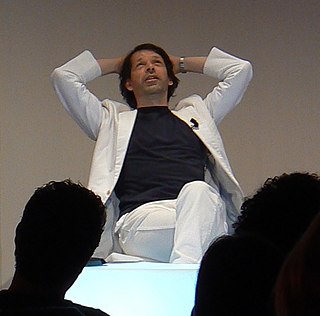A Quote by John Berger
The Cro-Magnons lived with fear and amazement in a culture of Arrival, facing many mysteries. Their culture lasted for some 20,000 years.
Related Quotes
Many teachers of the Sixties generation said "We will steal your children", and they did. A significant part of America has converted to the ideas of the 1960s - hedonism, self-indulgence and consumerism. For half of all Americans today, the Woodstock culture of the Sixties is the culture they grew up with - their traditional culture. For them, Judeo-Christian culture is outside the mainstream now. The counter-culture has become the dominant culture, and the former culture a dissident culture - something that is far out, and 'extreme'.
It seemed [there are] musical nodes on the planet where cultures meet and mix, sometimes as a result of unfortunate circumstances, like slavery or something else, in places like New Orleans and Havana and Brazil. And those are places where the European culture and indigenous culture and African culture all met and lived together, and some new kind of culture and especially music came out of that.
My grandfather lived to be 96 years old. He was born in a town outside of Salerno in Southern Italy. He came to New York when he was 20. He lived in the States from age 20 to 96, but he brought his culture with him, he brought his food with him, he brought his language with him, he never spoke a word of English.
People have come to me over the years and said to me: 'I admire the culture of Starbucks. Can you come give a speech and help us turn our culture around?' I wish it were that easy. Turning a culture around is very difficult to do because it's based on a series of many, many decisions, and the organization is framed by those decisions.
Once, the world was full of mysteries, some of them frightening, some of them wonderful, some of them merely fascinating. Now, it can be a banal and predictable place, the tracks of daily life so well-beaten and defined, our culture awash with the imbecile obvious, our existence suffocating in safety. But mysteries remain.
The language of the culture also reflects the stories of the culture. One word or simple phrasal labels often describe the story adequately enough in what we have termed culturally common stories. To some extent, the stories of a culture are observable by inspecting the vocabulary of that culture. Often entire stories are embodied in one very culture-specific word. The story words unique to a culture reveal cultural differences.
Since the 1960s, mainstream media has searched out and co-opted the most authentic things it could find in youth culture, whether that was psychedelic culture, anti-war culture, blue jeans culture. Eventually heavy metal culture, rap culture, electronica - they'll look for it and then market it back to kids at the mall.







































